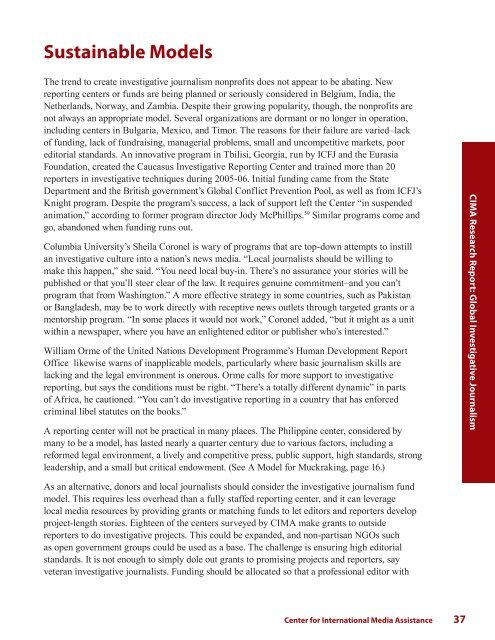CIMA-Investigative Journalism - Dave Kaplan
CIMA-Investigative Journalism - Dave Kaplan
CIMA-Investigative Journalism - Dave Kaplan
You also want an ePaper? Increase the reach of your titles
YUMPU automatically turns print PDFs into web optimized ePapers that Google loves.
Sustainable Models<br />
The trend to create investigative journalism nonprofits does not appear to be abating. New<br />
reporting centers or funds are being planned or seriously considered in Belgium, India, the<br />
Netherlands, Norway, and Zambia. Despite their growing popularity, though, the nonprofits are<br />
not always an appropriate model. Several organizations are dormant or no longer in operation,<br />
including centers in Bulgaria, Mexico, and Timor. The reasons for their failure are varied–lack<br />
of funding, lack of fundraising, managerial problems, small and uncompetitive markets, poor<br />
editorial standards. An innovative program in Tbilisi, Georgia, run by ICFJ and the Eurasia<br />
Foundation, created the Caucasus <strong>Investigative</strong> Reporting Center and trained more than 20<br />
reporters in investigative techniques during 2005-06. Initial funding came from the State<br />
Department and the British government’s Global Conflict Prevention Pool, as well as from ICFJ’s<br />
Knight program. Despite the program’s success, a lack of support left the Center “in suspended<br />
animation,” according to former program director Jody McPhillips. 59 Similar programs come and<br />
go, abandoned when funding runs out.<br />
Columbia University’s Sheila Coronel is wary of programs that are top-down attempts to instill<br />
an investigative culture into a nation’s news media. “Local journalists should be willing to<br />
make this happen,” she said. “You need local buy-in. There’s no assurance your stories will be<br />
published or that you’ll steer clear of the law. It requires genuine commitment–and you can’t<br />
program that from Washington.” A more effective strategy in some countries, such as Pakistan<br />
or Bangladesh, may be to work directly with receptive news outlets through targeted grants or a<br />
mentorship program. “In some places it would not work,” Coronel added, “but it might as a unit<br />
within a newspaper, where you have an enlightened editor or publisher who’s interested.”<br />
William Orme of the United Nations Development Programme’s Human Development Report<br />
Office likewise warns of inapplicable models, particularly where basic journalism skills are<br />
lacking and the legal environment is onerous. Orme calls for more support to investigative<br />
reporting, but says the conditions must be right. “There’s a totally different dynamic” in parts<br />
of Africa, he cautioned. “You can’t do investigative reporting in a country that has enforced<br />
criminal libel statutes on the books.”<br />
A reporting center will not be practical in many places. The Philippine center, considered by<br />
many to be a model, has lasted nearly a quarter century due to various factors, including a<br />
reformed legal environment, a lively and competitive press, public support, high standards, strong<br />
leadership, and a small but critical endowment. (See A Model for Muckraking, page 16.)<br />
As an alternative, donors and local journalists should consider the investigative journalism fund<br />
model. This requires less overhead than a fully staffed reporting center, and it can leverage<br />
local media resources by providing grants or matching funds to let editors and reporters develop<br />
project-length stories. Eighteen of the centers surveyed by <strong>CIMA</strong> make grants to outside<br />
reporters to do investigative projects. This could be expanded, and non-partisan NGOs such<br />
as open government groups could be used as a base. The challenge is ensuring high editorial<br />
standards. It is not enough to simply dole out grants to promising projects and reporters, say<br />
veteran investigative journalists. Funding should be allocated so that a professional editor with<br />
Center for International Media Assistance 37<br />
<strong>CIMA</strong> Research Report: Global <strong>Investigative</strong> <strong>Journalism</strong>


